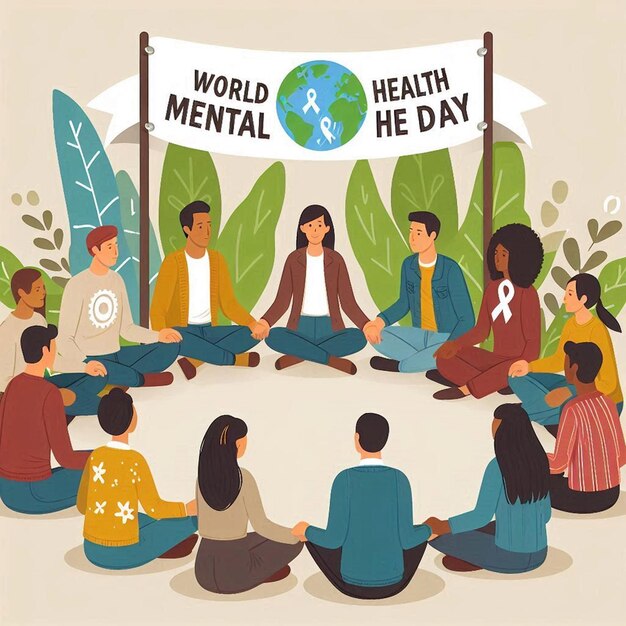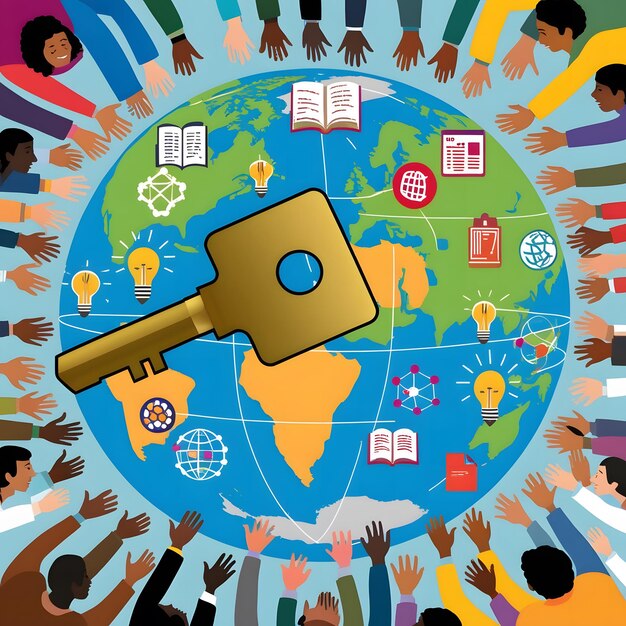World Mental Health Day:
Talking About It Is First and Foremost a Cultural Challenge
The Importance of Breaking the Stigma
Every year on October 10th, World Mental Health Day is observed to raise awareness about mental health issues and to mobilize efforts in support of better mental health care. This year’s theme, “Make a Difference,” calls upon us all to take action against the stigma surrounding mental health.
Why Is Talking About Mental Health a Challenge?
Despite progress in recent years, mental health remains a taboo topic in many cultures. The stigma surrounding mental illness often prevents individuals from seeking help, leading to suffering in silence. In some communities, people with mental health conditions are still viewed as weak or even shameful.
Addressing the Cultural Challenge
To make a difference, we must first acknowledge and understand the cultural challenges that hinder open dialogue about mental health. This involves challenging deeply ingrained beliefs and biases through education and raising awareness. We need to create safe spaces where people feel comfortable sharing their stories, experiences, and concerns without fear of judgment or discrimination.
The Power of Sharing Stories
Sharing personal stories about mental health struggles can be incredibly powerful in changing attitudes and breaking down stigma. It helps others to see that they are not alone, and it encourages empathy, compassion, and understanding. By being open about our own experiences, we can inspire those who are struggling to seek help and support.
Taking Action on World Mental Health Day
On this World Mental Health Day, let us commit to making a difference by addressing the cultural challenges surrounding mental health. Let us engage in open conversations, share our stories, and support those who are struggling. Together, we can create a world where seeking help for mental health issues is not a source of shame or fear but rather an act of courage and self-care.

World Mental Health Day: An Important Reminder to Address Mental Health Issues in Today’s Society
October 10 is recognized worldwide as World Mental Health Day, an annual event dedicated to raising awareness and fostering understanding about mental health issues. This day offers an opportunity for individuals, organizations, and governments to come together and show their support for those who struggle with mental health challenges. The importance of this day cannot be overstated, as mental health issues are becoming increasingly prevalent in today’s fast-paced, stressful world. According to the World Health Organization (WHO), approximately 1 in 4 people experience mental health problems at some point in their lives. Yet, despite this alarming statistic, there remains a significant cultural stigma surrounding mental health discussions.
Addressing the Importance of Mental Health
Mental health issues can take many forms, ranging from mild anxiety and depression to more severe conditions such as schizophrenia or bipolar disorder. Regardless of the specific diagnosis, mental health problems can significantly impact an individual’s quality of life and ability to function in daily life. Unfortunately, the cultural stigma surrounding mental health issues can make it difficult for people to seek help or even discuss their struggles openly. This silence perpetuates unnecessary suffering and prevents those who need assistance from receiving the care they deserve.
The Impact of Cultural Challenges
One of the most significant cultural challenges surrounding mental health discussions is the lingering belief that these issues are a sign of weakness or shame. This attitude can prevent people from seeking help, leading to a worsening of symptoms and potential harm. Another challenge is the lack of education about mental health issues and available resources, which can leave individuals feeling isolated and unsure where to turn for support.
Breaking the Stigma
To address these challenges and break the stigma surrounding mental health issues, it’s essential to promote open dialogue and education about mental health. This can involve speaking openly about personal experiences, sharing resources and information, and encouraging policy changes that support access to mental health care. It’s also crucial to challenge negative attitudes and stereotypes whenever they arise.
Empowering Individuals
Ultimately, empowering individuals to take charge of their mental health is key to addressing the challenges surrounding mental health discussions. This can involve learning coping skills and stress management techniques, seeking professional help when needed, and practicing self-care. By taking an active role in managing their mental health, individuals can reduce the impact of stigma and improve their overall wellbeing.
Conclusion
World Mental Health Day serves as a powerful reminder that mental health issues are common and deserving of our attention. By addressing the cultural challenges surrounding mental health discussions, we can create a more supportive and understanding environment where individuals feel empowered to seek help and manage their mental health effectively. Join the conversation and take a step towards breaking the stigma surrounding mental health.

Cultural Stigma and Mental Health: A Global Issue
Cultural stigma, the discrimination and negative attitudes towards individuals with mental health issues, remains a significant barrier to open discussions, early intervention, and effective treatment of mental health conditions worldwide.
Historical Perspective
Throughout history, societal beliefs and religious teachings have contributed to the stigmatization of mental health. In many cultures, mental illness was attributed to supernatural causes or seen as a sign of weakness or shame. For instance, during the Middle Ages, those with mental health conditions were often accused of being possessed by evil spirits and subjected to cruel treatments like exorcisms or confinement. Even in more recent times, mental illness was frequently kept hidden from public view due to the fear of social rejection and isolation.
Current Perceptions and Their Influence on Help-Seeking Behaviors
Bold and italic text for emphasis,
h4
for subheadings,
h5
for sub-subheadings, and
h6
for sub-sub-subheadings. Let’s examine the current perceptions that continue to impact help-seeking behaviors and mental health discussions.
Religious Beliefs
Despite advancements in understanding mental health and treatments, religious beliefs continue to perpetuate stigma. For example, some religious communities believe that mental illness is a punishment from God or a sign of personal weakness.
Social Norms
In many societies, discussing mental health issues publicly remains taboo. This can lead to individuals with mental health conditions feeling isolated and ashamed, hindering their willingness to seek help.
Workplace Discrimination
Employers and colleagues may discriminate against individuals with mental health conditions, making it difficult for them to disclose their condition or take time off for treatment.
Fear of Labels
The fear of being labeled as “crazy” or “mentally ill” can deter many people from seeking help. This stigma is particularly strong in certain cultures where mental health issues are still widely misunderstood.
Statistics Demonstrating the Prevalence of Cultural Stigma
Worldwide Data on Attitudes Towards Mental Health and Treatment
According to a World Health Organization (WHO) survey, more than 70% of people with mental health conditions do not receive the treatment they need due to fear of stigma and discrimination.
Specific Examples from Various Regions/Cultures
In China, the stigma surrounding mental health has led many individuals to avoid seeking help. Instead, they may turn to traditional Chinese medicine or self-help methods, which often fail to address the root causes of their mental health conditions.
In India, where mental health is still widely misunderstood and stigmatized, many people with mental health conditions are forced to hide their condition or face rejection from their families and communities.
Addressing cultural stigma requires a collective effort from governments, healthcare professionals, community leaders, and individuals themselves. By promoting open discussions about mental health, challenging discriminatory attitudes, and providing accessible, affordable treatments, we can help reduce the stigma surrounding mental health conditions and improve the lives of millions around the world.

I Breaking the Taboo: Strategies to Address Cultural Challenges
Education and Awareness Campaigns
- Role of governments, organizations, and educational institutions: Education and awareness campaigns are essential in challenging the cultural stigma surrounding mental health issues. Governments, non-profit organizations, and educational institutions play a critical role in promoting mental health awareness and reducing the shame and fear often associated with seeking help. They can allocate resources to funding research, implementing policies, and providing accessible mental health services.
- Success stories from initiatives that have made a difference: Initiatives such as Bell Let’s Talk and Time to Change have significantly impacted public perception of mental health issues. Bell Let’s Talk, a campaign by Bell Canada, encourages Canadians to share their experiences and conversations about mental health in exchange for donations. Time to Change, a UK mental health organization, aims to end the discrimination faced by people with mental health issues through various campaigns and initiatives.
Involvement of Celebrities and Public Figures
- Impact on destigmatizing mental health issues in society: The involvement of celebrities and public figures can help reduce the stigma surrounding mental health issues by encouraging open conversations about their experiences. By speaking publicly about their struggles with mental health, they normalize seeking help and challenge societal beliefs that mental illness is a weakness.
- Examples of influential individuals who have spoken out about their experiences: Demi Lovato and Prince Harry are just two examples of public figures who have bravely shared their mental health struggles. Lovato, a singer-songwriter, has been open about her battles with bipolar disorder and addiction. Prince Harry, the Duke of Sussex, has shared his experience with therapy following the loss of his mother, Princess Diana.
Media Representation and Portrayal of Mental Health
- Role of media in perpetuating or challenging stigma: Media plays a significant role in shaping public perception of mental health issues. By responsibly reporting on mental health, media can help challenge stereotypes and reduce stigma. Conversely, irresponsible reporting can perpetuate harmful beliefs.
- Best practices for responsible reporting on mental health issues: Best practices include using respectful language, avoiding stereotypes, and providing accurate information. Media outlets should also consult with mental health professionals when reporting on complex issues to ensure accuracy.
Grassroots Movements and Community Engagement
- Importance of building supportive networks and communities: Grassroots movements and community engagement are crucial for creating supportive environments that challenge stigma. By building networks where individuals can openly discuss their experiences, we can help reduce the shame and fear associated with mental health issues.
- Success stories from grassroots initiatives: Organizations like NAMI (National Alliance on Mental Illness) and Mental Health America have made significant strides in reducing stigma through their grassroots initiatives. These organizations provide support, education, and advocacy for individuals and families affected by mental health issues.

Personal Stories: Breaking the Silence and Challenging Stigma
Sharing personal experiences is a powerful tool in the fight against mental health stigma. Breaking the silence and openly discussing one’s struggles can help change perceptions, challenge stereotypes, and create a more compassionate society.
Importance of Sharing Personal Experiences
Individuals with mental health conditions have long been silenced by the stigma that surrounds these issues. This silence perpetuates misunderstanding, fear, and discrimination. By sharing their stories, they can help reduce stigma, promote empathy, and create a sense of community.
Case Studies: Individuals Who Have Shared Their Mental Health Struggles and Made a Difference
Two inspiring examples of individuals who have bravely shared their mental health stories are Kevin Hines and Elyn Saks. Kevin Hines, a suicide survivor, shares his experience in his TED Talk, “What Mental Illness Really Feels Like.” He describes the moment he attempted to take his own life and the subsequent realization that he wanted to live. Hines’s story not only humanizes mental illness but also offers hope and encourages open dialogue.
Elyn Saks, a renowned law professor, shares her experiences with schizophrenia in her memoir “The Center Cannot Hold: My Journey Through Madness.” Saks’s story is one of resilience and triumph. She uses her experiences to challenge the stereotypes surrounding mental illness and inspire others to seek help.
Tips for Those Considering Sharing Their Story
Sharing a personal story about mental health can be both rewarding and challenging. Here are some tips for those considering sharing their story:
Preparation and Planning:
Seek out a supportive network of family, friends, or mental health professionals before sharing your story publicly.
Consider the potential consequences and prepare yourself for both positive and negative reactions.
Seek professional help if you feel overwhelmed or unsure about sharing your story.
Potential Benefits of Sharing One’s Story:
Reducing stigma and changing perceptions about mental health.
Providing hope and inspiration to others struggling with similar issues.
Building a sense of community and connection with others who have experienced mental health challenges.

Conclusion
As we wrap up this discourse on mental health, it’s crucial to reiterate the significance of addressing cultural challenges that often hinder open conversations about mental health. The stigma associated with mental health issues continues to be a formidable barrier preventing many from seeking help, which can ultimately lead to devastating consequences.
Individuals
have a role to play in reducing stigma by fostering an environment of acceptance and understanding within their circles. They can share their knowledge, experiences, and resources with others, helping to promote a more holistic view of mental health.
Organizations
, particularly those in the healthcare sector, must continue their efforts in destigmatizing mental health through educational campaigns and policy changes. These initiatives can help create a supportive infrastructure that encourages individuals to seek help when they need it most. Finally,
governments
must invest in mental health resources and services, ensuring that everyone has access to the care they need to live healthy lives.
Call to Action:
We all have a part to play in breaking the silence surrounding mental health issues.
Individuals
can start by educating themselves on mental health topics, sharing resources within their communities, and encouraging open dialogue.
Organizations
, including schools, workplaces, and community groups, can create safe spaces for mental health discussions, provide resources, and promote mental wellbeing initiatives.
Governments
must prioritize funding for mental health services, research, and education, ensuring that mental health is a priority for all.
Encouragement:
For those currently struggling with mental health issues, we want you to know that you are not alone. Sharing your stories can help break the stigma and provide a sense of solidarity for others. It’s essential to remember that seeking help is a brave act, one that can lead to improved mental health and overall wellbeing. We encourage you to reach out for support from friends, family, or professionals, knowing that there is a community of people who care about your wellbeing.




